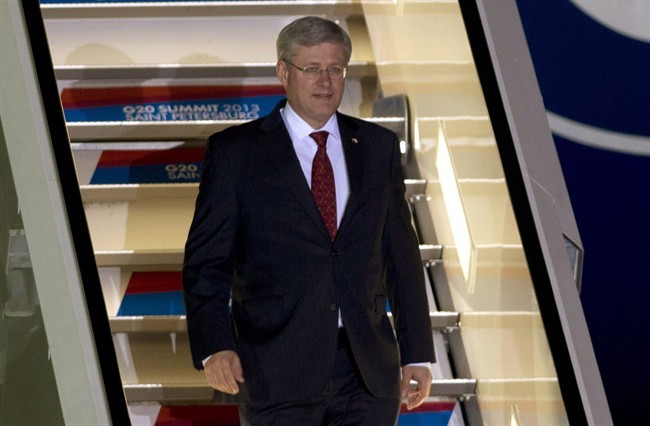OTTAWA – Prime Minister Stephen Harper’s office is sounding more conciliatory about an imminent resolution to the continent’s stalled free-trade talks with Canada, a senior European Union official said Thursday.

That view from Brussels comes as Harper prepares to meet European Commission president Jose Manuel Barroso on Friday, on the sidelines of the G20 summit in St. Petersburg, Russia.
READ MORE: Harper challenges G20 leaders to follow Canadian example on debt reduction
Peter Stastny, the union’s rapporteur on the Canada-Europe negotiations, said he is more optimistic than he was several months ago.
“The good news is, that I keep hearing, more and more a kind of conciliatory and optimistic rhetoric, particularly from the office of Prime Minister Harper of Canada,” Stastny said Thursday in a briefing to the European Parliament’s international trade committee.
“I’m probably more optimistic now than I was before. It could happen any time soon.”
Stastny said his optimism is based on his perception that Harper’s office is playing down the gaps that remain on the main unresolved obstacles to a deal, including access for Canadian pork and beef, drug patents and provincial procurements.
“They are minor issues that should be and could be solved,” he said.
“The rhetoric I keep hearing, from the EU, but mostly from Canada and (the) prime minister’s office, seems to minimize these issues, and they see the end of a tunnel that hopefully will come very … soon.”
A Canadian source close to the talks said a “small handful of key issues” remain on the table, including agriculture, intellectual property and procurement.
Adam Taylor, Trade Minister Ed Fast’s spokesman, said “focused disussions” continue across several key economic sectors, covering all regions of Canada.
“Canada has made robust offers in good faith that address the EU’s key interests,” Taylor said in an email. He did not elaborate.
“Canadians expect to be provided the same by the EU and we continue to make this clear to our EU counterparts.”
The Canadian source said the latest offer was to be put before EU political leaders, including Barroso, and Karel de Gucht, the EU Commissioner for Trade, for their collective response.
Harper’s office offered no public statement on his coming Friday meeting with Barrosso.
But the Canadian source said: “The ball is in the EU’s court. That remains what we’re waiting on.”
Despite that assessment, Stastny lamented that two big deadlines have been missed in wrapping up negotiations for the Comprehensive Economic and Trade Agreement (CETA), which Canada and Europe started four years ago.
The two sides want a deal in time for the European Parliament to ratify by next year. That would get it in before the union becomes distracted by separate talks with the United States, the Transatlantic Trade and Investment Partnership (TTIP).
“It’s getting overloaded,” Stastny said. “And we all could benefit, the (European) commission could benefit, if the CETA would be concluded before the TTIPs begin.”
The warning echoed previous ones by the Europeans that the Canadian talks could be shuffled to the back burner once the negotiations with the U.S. begin in earnest.
The U.S. and Europe formally opened discussions in July.
In August, the EU largely shut down for the summer, stalling the Canadian talks.
Fast said last month “a little flexibility” was needed from both sides when talks resume sometime this month.
In July, the now-departed EU ambassador to Canada, Matthias Brinkmann, blamed Ottawa for the logjam, saying a deal was possible in February. The comment was widely viewed as the latest in a series of European attempts to pressure Canada to reach a deal.
Fast later told The Canadian Press that what Brinkmann proposed was “not in Canada’s interest.”
Stastny said he received his own briefing from European negotiators earlier this summer.
“There was not too many surprises … it’s kind of bittersweet,” he said.
“It’s moving along. It’s moving along gradually.”
Stastny’s assessment Thursday appeared more upbeat than the one he gave to a delegation of Canadian parliamentarians visiting Brussels in April.
Then he expressed frustration at the pace of the talks, saying the delay was not a good signal to be sending in tough economic times.
With files from Jennifer Ditchburn in St. Petersburg, Russia.



Comments